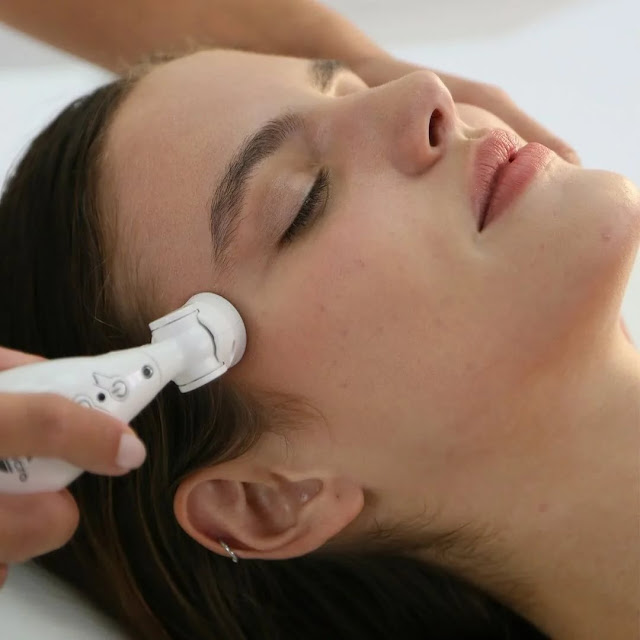SHOCKWAVE THERAPY
What are shock waves?
Shockwave therapy in the acronym
ESWT (extracorporeal shockwave therapy) is a treatment mainly offered to
physical therapy, sports medicine, and orthopedics for musculoskeletal
disorders.
Shock waves (not to be confused
with ultrasounds, which have a different 'wave morphology') are high-energy
acoustic waves produced by particular generators (electro-hydraulic,
electromagnetic or piezoelectric) and conveyed in the human body using a
transmission system that allows to focus them on the target to be treated and
to determine a direct mechanical stimulation.
There are two types of shock waves:
1. Radial (or ballistic)
Shockwave
2. Focal (or focused) shockwave
The radial shock waves are not
directed to a single point but radiate over the treated surface. Focused shock
waves are waves whose energy is concentrated on the point of the treated part.
The radial shock wave is generated using a special pistol-shaped handpiece. Doctor
Ali provides the best health
and wellness center in the USA. Inside the barrel, a
steel bullet is launched by compressed air at 4-5 bar of pressure against a
metal transducer placed as a cap of the gun. The collision generates a shock
wave that, through the metal cap, spreads radially into the treated tissue.
Each shock wave is characterized by a sudden increase in pressure (positive
pressure peak) followed by a slower phase of return to atmospheric pressure
(negative pressure): this determines the
In our facility, we use radial
shock waves using Storz devices, which guarantees medical equipment capable of
meeting the highest standards in terms of precision.
Fields of use
The therapeutic indications of
shock waves are extensive and varied:
·
Chronic enthesopathy
·
Knee tendonitis
·
Achilles tendonitis
·
Calcific and non-calcified Tendinopathy of the
shoulder
·
Muscle strains and contractures
·
Muscle calcifications
·
Treatment of trigger points
·
Exostoses of the hand joints
·
Bursitis
·
Achillodynia
·
Tibialis anterior syndrome Patellar Syndrome
·
Palagi
·
Treatment of the carpal tunnel
·
Hypertonia of neurological origin
Among the most common pathologies
on which it is possible to intervene with shock wave therapy at our facilities,
we mention:
·
Epicondylitis (tennis elbow): a painful syndrome
localized to the lateral epicondyle (i.e. on the outside of the elbow), often
secondary, more often than not, to a series of repeated microtraumas that have
occurred in the tendons of the extensor muscles of the wrist and hand, at their
proximal insertion on the epicondyle, resulting in tendon degeneration.
·
Plantar fasciitis: the set of symptoms with a
prevalence of pain involving the plantar fascia. It appears to be more common
in women and obese subjects, since in the latter, the weight causes the
crushing of the soft parts of the foot, causing stress. The most common symptom
occurs in the morning when the person gets out of bed and, placing their feet
on the ground, feels pain in the heels. The pain increases if it is triggered
with physical activity or other stimulation. It usually has at least six months,
rarely reaching a year.
·
Heel spine: frequent pathology affecting the
hindfoot. Often confused with plantar fasciitis due to its similar initial
symptomatology, the heel spur is a small formation of excess bone on the lower
tip of the heel. This growth is generally located on the inside of the heel
near the insertion of the plantar aponeurosis or the longitudinal ligament.
Epithrocleitis is also called
'golfer's elbow' (due to its frequent tendency in subjects who practice this
sport). It is a form of enthesopathy similar to epicondylitis (tennis elbow)
but rarer. The painful area is the medial one and involves various muscles such
as radial flexor, ulnar flexor of the carpus, and long palmar flexor.
Risks
It is essential to point out that
shock wave therapy is not recommended in some categories of patients.
We refer to patients with
neoplasms, coagulopathies, polyneuropathies, pacemakers, pregnant subjects, and
in the presence of growth cartilage nuclei, as in the case of very young
patients.
Hints of history
Since 1980, shock waves have been
used in the medical field in the treatment of lithiasis pathologies of the
urinary tract (disintegration of kidney stones) with the idea of being able
to destroy the target structures present inside the organism, acting from the
externally and in a non-invasive way, without damaging the surrounding tissues.
In the mid-1980s, new studies
opened further horizons on the therapeutic potential of shock waves,
particularly in the orthopedic field for both soft tissue and bone tissue care.
In recent years, research has
increased in the dermatological field, where shock waves accelerate the healing
of chronic wounds, burns, diabetic ulcers. Other relatively recent fields of
use concern: bone healing and welding in the presence of fractures, chest pain
associated with heart disease, treatment of chronic pelvic pain syndrome and
erectile dysfunction, and heel pain. The pain increases if it is triggered with
physical activity or other stimulation. It usually has at least six months, rarely
reaching a year. The heel spur: frequent pathology affecting the hindfoot. Doctor
Ali provides the best holistic
medicine center in the USA. Often confused with plantar fasciitis
due to its similar initial symptomatology, the heel spur is a small formation
of excess bone on the lower tip of the heel. This growth is generally localized
in the inner part of the heel near the insertion of the plantar aponeurosis or
the longitudinal ligament
Epithrocleitis is also called
'golfer's elbow' (due to its frequent tendency in subjects who practice this
sport). It is a form of enthesopathy similar to epicondylitis (tennis elbow)
but rarer. The painful area is the medial one and involves various muscles such
as radial flexor, ulnar flexor of the carpus and long palmar flexor




Comments
Post a Comment